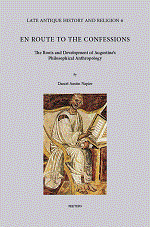 © Peeters
© Peeters
Napier, Daniel Austin
En route to the Confessions
The Roots and Development of Augustine's Philosophical Anthropology
(Late Antique History and Religion 6)
Inhalt
By any standard, Augustine of Hippo casts an imposing shadow. With a retrospective distance of 1600 years, his influence on Western thought, political structures, religious institutions, and selfhood seems obviously the work of a giant. However, this god-like figure did not burst forth full-grown. His prodigious creativity was both constrained and aided by a rich complex of theological and philosophical traditions.
En route to the Confessions charts the development of Augustine’s various understandings of the human person by tracing his phased interactions with particular intellectual traditions and issues from his conversion until his composition of the Confessions. The correlated alterations to Augustine’s use of spiritual exercises for human development at each stage are also explored. Augustine’s anthropological thinking emerges therein as a series of strikingly fruitful yet thoroughly human syntheses of ancient philosophic and Christian thought.
Augustine’s philosophical resources and strategical alliances turn out to be much broader than most scholarly accounts have acknowledged. In particular, Augustine made much more extensive use of Roman Stoic conceptualities and argumentative strategies in constructing his philosophical anthropology than heretofore considered.
Bibliographische Informationen
| Erscheinungsform: | Hardcover |
| Umfang: | XXXVI-348 Seiten |
| Sprache: | Englisch |
| ISBN-13: | 978-90-429-2916-6 |
| Verlag: | Peeters |
| Erscheinungsort: | Leuven |
| Erscheinungsjahr: | 2013 |
| Preis: | 87,00 EUR |
Weiterführende Links


